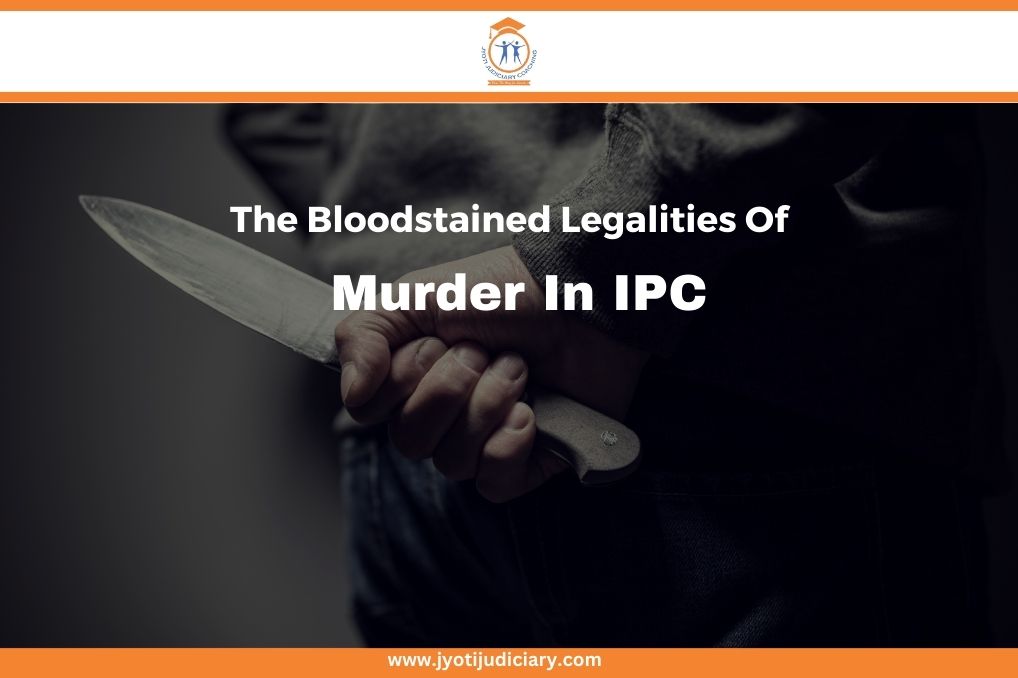
The most horrible crime, murder, has the most severe social stigma and greatest legal consequences of all the crimes. One of the main foundations of Indian law is the Indian Penal Code (IPC), which defines the legal parameters surrounding murder.
Murder in IPC
The Indian Penal Code defines murder in Section 300. Culpable homicide is regarded as murder under this Act if:
- The purpose of the act is to induce death.
- The act is performed with the knowledge that it will result in death via causing bodily harm, as the perpetrator intends.
- When someone conducts an act knowing it is harmful and could result in death or serious damage, it is considered murder.
Murder in ipc: Essential Ingredients
- The act of causing death must be intentional.
- When performing an act, there should be a deliberate attempt to cause bodily harm that could result in death, or
- Even though it is likely to result in someone else’s death, the act nonetheless needs to be carried out.
section 302 ipc: Punishment
The penalty for a murderous offense is discussed in Section 302 of the Indian Penal Code. Nonetheless, the Indian Penal Code’s section 300 describes the crime of murder. Additionally, Section 302 IPC discusses the legal mechanism that punishes this horrible crime.
- This section states that the person who commits a homicide will be met with a fine and either the death penalty or life in prison. This section applies to all people, regardless of gender. It even applies to a local authority who murders someone due to narrow-minded objectives. No one is exonerated of the crime of homicide by the IPC.
- It says rather clearly in Section 302 IPC, “Whoever carries out murder.”
- Furthermore, there is no compounding or bailing for the crime of homicide.
- The death penalty and life in prison are the two forms of discipline that are covered in this section.
- The offender will likewise be liable for a fine if one of these disciplines is enforced.
IPC 302 is bailable or not?
- Since murder is an offense that is not subject to bail, compounding, or cognizable, most bail requests are denied.
- As a result, the courts have a legal duty to thoroughly review the case’s facts and circumstances.
section 302 ipc: Applicability
Section 302 of the Indian Penal Code has three exceptions listed in Section 304 that prevent the section from applying.
- The mere fact that an individual has committed a murderous act does not warrant the application of section 302.
- Intention, motives, physical harm, injury resulting in death, and other variables are also taken into account.
Murder Case: Punishment for Minor
- Anyone who is younger than eighteen is referred to as a “minor”. Without thoroughly assessing the nature of the offense, minors are not given life sentences or the death penalty.
- Given that children represent the future of every generation, the court must thoroughly examine the circumstances before imposing any sanctions.
- The court has to investigate the circumstances surrounding the minor’s murderous act.
- The law of proof is the foundation for the punishment of a minor. Since they are under the age of eighteen, their punishment is determined by the Juvenile Justice (Care and Protection of Children) Act, of 2000.
landmark judgment on 302 ipc
In order to determine whether the death penalty under section 302 IPC is inconsistent with constitutional values, there have been a number of advances regarding the constitutional legitimacy of this section.
- In the Arushi Talwar case, on May 16, 2008, Arushi, then 14 years old, and Hemraj Banjade, then 45, were both killed. Arushi’s parents were among the several suspects named on the accused list. Public attention was piqued by this case, which garnered extensive media coverage. Arushi’s parents had been detained for a very long period. It’s still unclear who the other two-house servants were, Arushi’s parents or someone else. Nobody knows who killed Ayushi and Hemraj, even though Arushi’s parents had been found not guilty.
- In the Sharath murder case, Sharath was a 19-year-old who was assassinated in Bangalore. His father was an income tax official. With his hands bound together, Sharath’s body was discovered outside the city close to Ramohalli Lake. It transpired that Sharath had been killed by strangulation by the kidnappers, and that same day they had dumped his body. The police discovered that the abductors were friends of Sharath, and that it was Vishal, a close friend of Sharath’s, who had orchestrated the murder and kidnapping in order to pay off the loan.
Murder in IPC FAQs
- What are the essentials of attempt to murder?
It is not enough to just hurt someone; there must be a murderous purpose. Consequence Knowledge: The accused must be aware that the action could have fatal consequences. Mens Rea may apply even in cases where there was no explicit intent to kill but knowledge of the possibly lethal outcome.
- What are the exceptions of murder?
If the act of culpable homicide is carried out spontaneously during a furious altercation, without any prior planning, and without any malice or atypical behaviour on the part of the perpetrator, it does not qualify as murder.
- What are the provisions of murder?
Section 302 of the Indian Penal Code states that anyone found guilty of killing someone faces a life sentence in jail or the death penalty in addition to a fine.
- What are the ingredients of murder?
According to the Indian Penal Code, murder is a serious crime with serious repercussions on the legal front. The key components that constitute the crime of murder are its ingredients, which include the unlawful act, intention, causality, and lack of legal justification.
- What is the punishment of murder?
According to Section 302 of the IPC, murder carries a life sentence or the death penalty. Considering the specific facts and circumstances of each case, the court has the authority to determine the appropriate sentence. The death sentence may be imposed by the court in murder cases involving unusual brutality or cruelty.
- What are the side effects of murder?
Homicide has detrimental repercussions on the lives of surviving family members, especially children, in addition to its immediate impacts. Anxiety, sadness, PTSD, anger, guilt, and a heightened sense of vulnerability are some psychological repercussions.
- What is the difference between culpable homicide and murder?
In order to distinguish between the two, intention is essential. While culpable homicide comprises an intention to cause bodily injury that is likely to result in death, murder requires a manifest intention to cause death.
- Which coaching is best for judiciary?
The most effective judiciary coaching in Jaipur is provided by Jyoti Judiciary Coaching. The objective is to create a comfortable learning environment for the students. It makes the difficult task seem easy, which increases the likelihood of achieving the desired outcome. The objective at Jyoti Judiciary is to give students the best possible education possible. The Institute pledges to use every resource at its disposal to provide you with the finest preparation for the Judicial Services entrance examinations.
- Which coaching is best for RJS preparation?
“Jyoti Judiciary Coaching” is a reputable coaching program in Jaipur that helps prepare students for the RJS exam. The finest online and offline RJS coaching program in Jaipur, Jyoti Judiciary, enables a methodical approach to preparing for the RJS examination. Their curriculum has been carefully designed to cover all the subjects and courses necessary for passing the Rajasthan Judicial Services Exams.
With the goal of giving students the best coaching available for law entrance exams including the CLAT, AILET, and various other numerous state judiciary exams, Jyoti Judiciary Coaching, India’s Finest educational Platform, was established. Come enrol now with Jyoti Judiciary!
For any latest news, legal topics, judiciary exams notifications, patterns, etc watch Jyoti Judiciary’s YouTube channel for legal videos for any updates at https://youtube.com/@jyotijudiciarycoaching4852?si=2cwubh9d2A9urwJf









